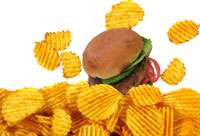|
|
Junk Food Develops Addiction to Drugs
By Irina Shlionskaya
- February 07, 2010
 For a long time scientists were puzzled with people’s addiction to junk food. Only recently, scientists from the Scripps Research institute in Florida discovered that foods high in calories can be as addictive as drugs. Doughnuts, hamburgers and chips contain a whole bouquet of addictive components.
Normally, obese people get very nervous when hungry. They remain nervous until they eat a pizza, hamburger or any other food high in calories and harmful for their health.
Feeling of being fool makes obese people relaxed and happy. When overweight people diet, they may feel continuous psychological discomfort despite of the lost weight. Usually we judge these people saying they are weak-willed. Yet, junk food is a necessity for them, not a whim. Of course, no one adds drugs into food. Salt, sugar and fat contained in most junk food stimulate production of endorphins, hormones of happiness, in our body.
If junk food is consumed on a regular basis, our body starts demanding it in larger quantities, same as drug addicts require bigger dosages of cocaine or heroin. Obese people cannot help but stop at a fast food joint or eat two desserts instead of one.
In the course of the experiment, Paul Kenny, head of research, used three groups of lab rats. The first group was fed regular portions of healthful food, the second group was fed limited amounts of junk food, and the third group was given high-calorie foods including fatty meats, cookies, chocolate and donuts.
The rats in the first two groups displayed no changes, while the rats in the third group quickly gained weight.
The scientists used electrical stimulations to activate pleasure centers in the rats' brains. They discovered that the rats fed junk food needed more food, indicating that they needed more stimulation to feel good. The researchers suggested the same happens to people.
Paul Kenny said that copious amounts of junk food make people lose control, which is the main sign of addiction.
"This is the most complete evidence to date that suggests obesity and drug addiction have common neurobiological underpinnings," said study coauthor Paul Johnson.
It has been proven long time ago that there is addiction to sweets. Many confess that they cannot live without candy or other sweets. When these people remove sugar from their diet for a couple of days, they become depressed.
Recently, scientists from the Princeton Neuroscience Institute conducted an experiment where they daily fed lab rats with sugar, increasing the dosage. When sugar was removed from the rats’ diet, they showed signs of withdrawal. It turned out that, among other things, sugar had a calming effect.
Why are some people more addicted than others?
First of all, it is all individual. Some people gain weight after eating a sandwich, while others can eat all they want without gaining any weight.
Second, the reasons that make us consume junk food matter . People eat sweets when they are not happy with something. Children who have difficulties building relationships with other kids or feel under-loved often develop a sweet tooth.
Adults eat when they are stressed because sweets can alleviate stress. When we feel relived eating sweets it is a sure sign we will use the same stress reliever next time. Later, we will need a double portion to feel good.
Seek alternative ways of stress-relief, watch your kids and do not shy away from therapists – this will help to avoid junk food addiction.
|
|
|
|
|
|  |
|
 For a long time scientists were puzzled with people’s addiction to junk food. Only recently, scientists from the Scripps Research institute in Florida discovered that foods high in calories can be as addictive as drugs. Doughnuts, hamburgers and chips contain a whole bouquet of addictive components.
For a long time scientists were puzzled with people’s addiction to junk food. Only recently, scientists from the Scripps Research institute in Florida discovered that foods high in calories can be as addictive as drugs. Doughnuts, hamburgers and chips contain a whole bouquet of addictive components.
 We recommend
We recommend



